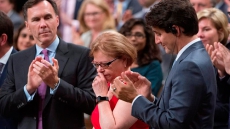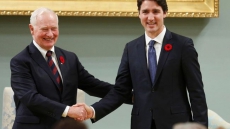About half of the asylum claims heard so far from those who've crossed the Canada-U.S.. border since July have been rejected, the Immigration and Refugee Board said Tuesday.
But the actual number of cases the board has heard since then is a mere fraction of the 8,000 or so claims that have been filed to date.
Shereen Benzvy Miller, the head of the IRB's refugee protection division, told a House of Commons immigration committee hearing that 240 have already been finalized, and a further 373 had been scheduled as of earlier this week, with the rate of rejection around 50 per cent.
That's in line with the historical acceptance rate for claims by Haitian nationals in past years; the vast majority of the asylum seekers who have arrived in Quebec in particular since the summer are Haitian.
In August, the board set up a dedicated team of 17 members to hear asylum claims solely from the border crossers. The fate of those who crossed before July remains unclear, as those claims were just part of the board's general caseload and aren't specifically tracked.
The dedicated team is aiming to hear about 1,500 cases between now and the end of November. After that, claims from the border crossers will go back to being part of the regular workflow.
It's a case load that has overwhelmed the board, Miller told the committee Tuesday.
The board is funded to hear at most 24,000 cases a year and at present, is anticipating more than 40,000 to be filed in all of 2017.
There are currently 40,000 cases in the backlog as well, she said. Wait times for a hearing are currently about 16 months with nowhere to go but up, she added.
"The math is clear — unless you put more resources to this problem, then it takes longer time to schedule so there will be longer wait times."
The reason so many people have chosen to cross illegally into Canada in order to claim asylum is the Safe Third Country agreement with the U.S., which prohibits people from making asylum claims at land border entry points, though there are some exceptions.
Critics of the deal say current immigration policy in the U.S. makes that country anything but safe for asylum seekers, but immigration officials insisted Tuesday they believe the U.S. asylum system is still functioning.
A policy review carried out on the agreement indicated that the asylum system in the U.S. had not changed as of January, said Andre Baril, the director of asylum policy for Immigration, Refugees and Citizenship Canada.
Still, a legal analysis of the deal is also being done, and two international experts have been drafted to do another to "confirm the conditions that existed continue to be met," he told the committee.
Both the NDP and Conservatives have called for the Liberal government to either suspend or amend the deal. The NDP say suspension, which would allow asylum claimants to just enter at regular ports of entry, is the humane choice. The Conservatives say the deal should apply across the entire border so claims can't only be lodged at land entry points.
A report on focus groups held by the department earlier this year on immigration policy describes two predominant positions on the deal. One group couldn't understand why illegal border-crossers are allowed to stay, while those who show up at designated points of entry are turned away.
"For these participants, the agreement is counterintuitive and the logic of the agreement should be either reversed or more complete so that those who cross 'illegally' are also turned back."
While no one in the focus groups proposed suspending the deal, some participants agreed it made some sense when the idea was put forward as a hypothesis.
"There was a sense that these refugee claims are justified and by having more, even if not all, claimants present at designated ports of entry, Canada is at least establishing more control over who crosses our border."
Image used for representation purposes only





